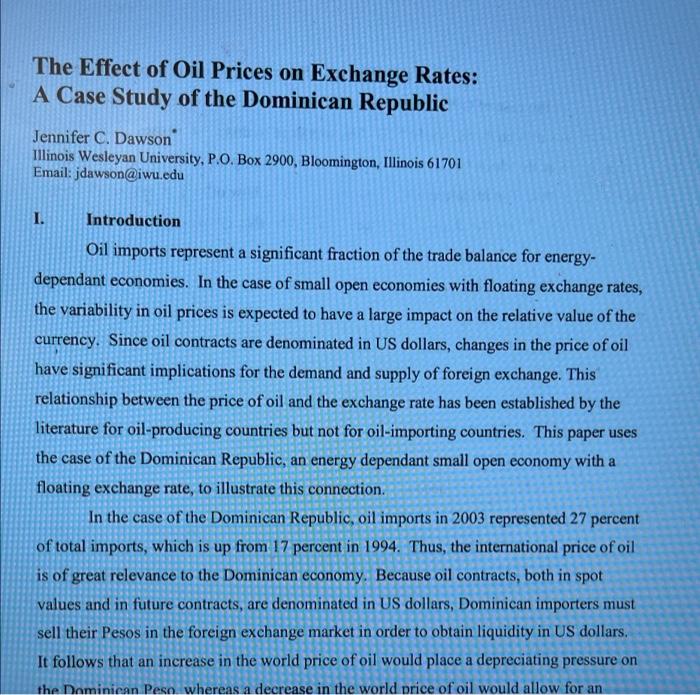please analyse the case in 250 words

The Effect of Oil Prices on Exchange Rates: A Case Study of the Dominican Republic Jennifer C. Dawson Illinois Wesleyan University, P.O. Box 2900, Bloomington, Illinois 61701 Email:jdawson@iwu.edu I. Introduction Oil imports represent a significant fraction of the trade balance for energydependant economies. In the case of small open economies with floating exchange rates, the variability in oil prices is expected to have a large impact on the relative value of the currency. Since oil contracts are denominated in US dollars, changes in the price of oil have significant implications for the demand and supply of foreign exchange. This relationship between the price of oil and the exchange rate has been established by the literature for oil-producing countries but not for oil-importing countries. This paper uses the case of the Dominican Republic, an energy dependant small open economy with a floating exchange rate, to illustrate this connection. In the case of the Dominican Republic, oil imports in 2003 represented 27 percent of total imports, which is up from 17 percent in 1994. Thus, the international price of oil is of great relevance to the Dominican economy. Because oil contracts, both in spot values and in future contracts, are denominated in US dollars, Dominican importers must sell their Pesos in the foreign exchange market in order to obtain liquidity in US dollars. It follows that an increase in the world price of oil would place a depreciating pressure on the Daminican Pesn whereas a decrease in the world price of oil would allow for an The Effect of Oil Prices on Exchange Rates: A Case Study of the Dominican Republic Jennifer C. Dawson Illinois Wesleyan University, P.O. Box 2900, Bloomington, Illinois 61701 Email:jdawson@iwu.edu I. Introduction Oil imports represent a significant fraction of the trade balance for energydependant economies. In the case of small open economies with floating exchange rates, the variability in oil prices is expected to have a large impact on the relative value of the currency. Since oil contracts are denominated in US dollars, changes in the price of oil have significant implications for the demand and supply of foreign exchange. This relationship between the price of oil and the exchange rate has been established by the literature for oil-producing countries but not for oil-importing countries. This paper uses the case of the Dominican Republic, an energy dependant small open economy with a floating exchange rate, to illustrate this connection. In the case of the Dominican Republic, oil imports in 2003 represented 27 percent of total imports, which is up from 17 percent in 1994. Thus, the international price of oil is of great relevance to the Dominican economy. Because oil contracts, both in spot values and in future contracts, are denominated in US dollars, Dominican importers must sell their Pesos in the foreign exchange market in order to obtain liquidity in US dollars. It follows that an increase in the world price of oil would place a depreciating pressure on the Daminican Pesn whereas a decrease in the world price of oil would allow for an







